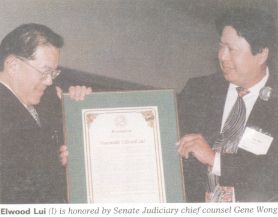|
|
|
| Statistics tell story of stress, addiction in lives of
lawyers |
 |
By NANCY McCARTHY
Staff Writer |
 |
Statistics tell the story: 13 percent of lawyers in
an ABA survey said they drink six or more alcoholic beverages a day. One-third of the
lawyers on disciplinary probation in California have a substance abuse monitoring
component as part of their probation. More than 18 percent of the attorneys in the state
of Washington are dependent on alcohol and as many as 19 percent appear to be clinically
depressed. Between 20 and 25 percent of lawyers suffer from stress so severe it impairs
their practice.
California has never conducted a formal survey of its lawyers’
drinking habits or stress-related problems, but the amount of burnout and chemical
dependence among members of the State Bar is well-known.
Dave Dawson, vice president of The Other Bar, a lawyer-to-lawyer
program for alcoholics, estimates between 15 and 17 percent of California attorneys are
alcoholics. Fran Bassios, head of the bar’s discipline system, says substance abuse
plays a role in 25 to 35 percent of the lawyers who face formal charges. The Lawyers
Personal Assistance Program, a free, confidential service for impaired attorneys, receives
200 calls a year.
Although most professionals do not believe chemical dependence is
more rampant among attorneys than in society at large, they think lawyers face a
particular set of obstacles to getting help.
They are counselors and problem-solvers, reluctant to seek help for
themselves. They might fear that reaching out could result in getting caught. “Lawyers
have a big ego,” says Dawson, a partner at Tobin and Tobin in San Francisco. “Denial
is much greater for lawyers than for any other professional.” |
See STRESS, ADDICTION |
|
| State Bar's new fee statement: Easier to read, easier to use |
 |
By NANCY McCARTHY
Staff Writer |
 |
 In the past, paying State Bar dues might have been both hard on the
pocketbook and confusing. Over the past few years, however, bar dues have declined,
somewhat easing the financial hit. And this year, bar officials hope the confusion will
disappear as well. In the past, paying State Bar dues might have been both hard on the
pocketbook and confusing. Over the past few years, however, bar dues have declined,
somewhat easing the financial hit. And this year, bar officials hope the confusion will
disappear as well.
A concerted effort to make the membership fee statement easy to read
and easy to use has resulted in a simpler billing that will be sent to every attorney next
month.
It will list what each attorney must pay including annual mandatory
fees and the amounts requested for voluntary donations to the Conference of Delegates and
the Foundation of the State Bar. It also will provide for enrollment in the bar’s
sections.
Some lawyers will see charges for late fees, restitution to the
Client Security Fund, a fee for failing to complete continuing education requirements or
for another of 11 possible categories for which an attorney might owe money to the bar for
a reason other than dues.
“Our strategy was to let people know we bill different people
for different things,” said Elyse Cotant, director of membership services. “It
gives people an idea of the different revenue streams flowing into the bar.”
 Those who do not wish to support the bar’s lobbying efforts
in Sacramento may deduct $5 from their payment. Those who don’t care to contribute to
programs addressing bias in the profession will be able to Those who do not wish to support the bar’s lobbying efforts
in Sacramento may deduct $5 from their payment. Those who don’t care to contribute to
programs addressing bias in the profession will be able to
|
See BAR'S NEW |
|
|
 |
| State bar honors extraordinary service |
 |
The State Bar this fall honored several
distinguished attorneys and judges for their outstanding contributions to the legal
profession. Among the honorees were federal appellate Judge Dorothy Wright Nelson for a
career of extraordinary service to the legal profession, retired appellate Justice Elwood
Lui for his work as a special master overseeing the bar’s discipline fund, and some
470 California lawyers who have practiced as specialists for more than 20 years.
Dorothy Wright Nelson
Longtime federal appellate Judge Dorothy Wright Nelson received the
Bernard E. Witkin Medal in recognition of a career of extraordinary service as well as her
contributions to the quality of justice and legal scholarship in California. The Witkin
medal recognizes attorneys “who have changed the landscape of California
jurisprudence.”
Nelson, 72, was honored at the State Bar’s annual meeting in San
Diego.
She was cited for her unfailing courtesy, kindness and collegiality,
and for a career which “has greatly influenced the science of jurisprudence and the
quality of justice in the legal profession, not only in our state but throughout the
world.”
A
colleague and friend of Witkin, Nelson taught at the University of Southern California Law
Center from 1957-80 and served as its dean for 11 years. She left the school when she was
appointed to the U.S. |
See BAR HONORS |
|
| Bar wins two cases before U.S. high court |
 |
The U.S. Supreme Court denied two petitions by
California lawyers last month seeking review of some continuing education requirements and
of reciprocity rules in federal district courts.
The justices let stand a decision by the 1st District Court of Appeal
in February upholding the State Bar’s requirement that attorneys complete classes on
the elimination of bias and the prevention of substance abuse and emotional distress as
part of its minimum continuing legal education (MCLE) program.
Three
California attorneys had |
See BAR WINS |
|

